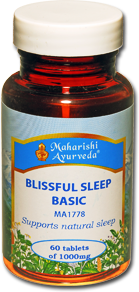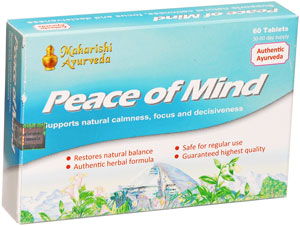People who regularly get less than six hours sleep a night are 12% more likely to die over a 25-year period than those who get 6-8 hours, according to a study at the University of Warwick.
And since Ayurveda means “the science of life”, it’s not surprising to see a host of strategies available to assist in gaining sound sleep, one of the three fundamental pillars of health according to ancient Ayurvedic texts.
In the blog “How to get a good night’s sleep”, we looked at how to fall asleep easily; daily cycles of time being divided into the familiar categories of Vata, Pitta and Kapha in Ayurveda, a big clue to falling asleep effortlessly is the time we go to bed. 10pm is the start of a 4-hour cycle governed by the Pitta tendency; going to bed at or before 10pm, at a time governed by the soothing, relaxing Kapha dosha, greatly assists with falling asleep, and means that sleep will be of a better quality.
That’s important. Quality is as vital as quantity when it comes to sleep. According to Ayurveda, only the deepest part of sleep produces what’s called ‘ojas,’ described as the most refined product of mind and body, which is a key source of mental and physical wellbeing.
How can I get back to sleep?
27% of Britons have no problem with falling asleep – but find themselves waking up, sometimes continually, perhaps with feelings of tension, or being so wide awake that it’s impossible to fall back to sleep. Then, the next morning, they’re exhausted. Sometimes they’re tired and sluggish even if they’ve had a full night’s sleep.
Once again, the Ayurvedic cycles of time offer a clue to remedies for both of these problems.
10pm till 2am is governed by Pitta dosha; waking up during these hours can mean that Pitta is out of balance in our mind or body. Pacifying Pitta will help us get back to sleep easily.
What’s the best way to wake up fresh? Well, 2am till 6am is a 4-hour timespan governed by Vata. That’s the Ayurvedic principle governing movement; it’s your ‘active and alert’ dosha, to quote Ayurvedic expert and author Dr Nancy Lonsdorf. Getting up during this Vata time, by 6am, launches you into your day on a wave of activity and alertness, helping you to feel your best.
But if you stay in bed beyond 6am, and get up in the 4-hour Kapha timespan (6am – 10am), then the sluggishness characteristic of out-of-balance Kapha may follow you through the day. People who say they’re not “morning people” may simply be getting up too late, and not finding much mental alertness until midday or later as a result.
So here are a few tips to balance Pitta (if you wake up between 10pm and 2am); and Kapha (for those who wake up feeling sluggish & tired).
To pacify Pitta:
- Avoid spicy foods – Pitta is the fiery dosha, so to balance it you need cooling influences
- Paint your bedroom blue. Sounds crazy, but recent research found blue-painted rooms helped people to sleep. (And blue is a cooling colour….)
- Avoid skipping meals.
- Eat enough in the evening so that you don’t feel hungry during the night.
- If your head feels hot when you wake up in the night, massage it with coconut oil (you could add a few drops of lavender oil as well).
- Before going to sleep, massage your feet with coconut oil.
- Drink Pitta tea several times a day
To pacify Kapha
- Make sure you get up by 6am
- Do a morning massage with sesame oil
- Exercise every day, to 50% of your capacity
- Avoid eating too much heavy, sweet, sour and salty foods
- Drink Kapha tea several times a day
 Blissful sleep
Blissful sleep
Does Ayurveda have have any recommendations about which herbs/minerals would be helpful to promote sleep? Indeed it does. Maharishi Ayurveda has a number of herbal combinations, in tablet form, known as the Blissful Sleep range.
These formulas promote sleep, and help remove the damaging effects of lack of sleep. There’s the Blissful Sleep Basic product, and then Vata, Pitta, and Kapha versions of the preparation, which help balance the appropriate dosha while promoting good sleep.
Other approaches
Exercise
Go for a gentle stroll in the evening. And/or practise – slowly – some simple Yoga asanas before going to bed, ideal for smoothing out tensions from the body.
 Reduce stress with Transcendental Meditation
Reduce stress with Transcendental Meditation
Never mind what time it is, some people just can’t sleep because they’re worrying too much. The single most effective Ayurvedic stress-buster doesn’t come in tablet form – it’s a simple mental technique called Transcendental Meditation, which delivers very deep rest to mind and body. Easy to learn in 1-to-1 instruction, and effortless and pleasant to practise, TM has been learned by 6 million people worldwide since it was introduced by Maharishi Mahesh Yogi 50 years ago. People under stress who learn TM often notice an improvement in their sleep within days (or nights). Over 600 scientific studies back up TM’s benefits. Visit: t-m.org.uk.
 Peace of Mind
Peace of Mind
Maharishi Ayurveda have a number of herbal combinations which help combat stress to choose from, including Peace of Mind, which as the name suggests, contain herbs which are associated with calmness and wellbeing. They include Jatanmansi, Brahmi and Ashwagandha. The formulation helps reduce stress and improve mental resilience.
Working and living environment

Not everything which helps you to sleep well occurs at night. A study released just this week which was presented to the American Academy of Sleep Medicine found that boosting the amount of natural light in an office can significantly improve sleep at night. “The extent to which daylight exposure impacts office workers is remarkable,” said the study co-author, Ivy Cheung.
There’s an associated branch of Vedic knowledge which goes into great detail about optimum working and living environments, including best practice in direction, proportion, and placement of buildings and guidlines for natural light, ventilation, and other factors. It’s called Maharishi Sthapatya Veda.






